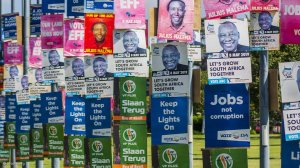South African Institute of International Affairs (SAIIA) researcher Isabel Bosman said on Tuesday while coalition governments are unusual or outside the norm, they could be considered a natural provision of democratic politics.
Bosman was speaking during SAIIA’s pre-election workshop, where she highlighted that perfecting coalition governments would not miraculously work overnight, but would take time and continuous effort.
“I do not think coalitions are something to be resisted, they should be studied and debated so that we can better understand them and so that they can improve,” she said.
With South Africa gearing up for its most crucial elections later this month, the term coalition has gained prominence, fuelled by pre-election polls suggesting a high likelihood of a coalition government as the ruling African National Congress’s (ANC’s) majority declines further in projections.
Bosman noted that a coalition government at national level had been poised to be the only sort of viable solution to stable and accountable governance, however, it was not clear what such a coalition would look like.
She said that the idea of coalitions was not new in the country, noting that throughout South Africa’s democratic history provincial and national coalition governments had existed.
Coalitions are lauded for their potential to bridge diversity and foster inclusive governance, however, concerns loom over their stability and governance efficacy, particularly following South Africa's upcoming election.
SAIIA highlighted that instances of coalition governments failing to fulfil their obligations, especially in major metropolitan areas, had raised doubts.
“Mayors from smaller parties have faced ousting; concerns persist regarding dominant partners' unwillingness to compromise within coalitions; a lack of transparency is eroding voter trust, and experts suggest there is a dearth of a ‘coalition governance culture’ in the country,” the Institute said.
Bosman highlighted that the iterations of coalitions in practice at a local government level could be used as a new governance model to improve leadership, share government practices and service delivery to guide the future national government trajectory.
She said much reflection must take place for the model to become viable.
“Certainly coalition governments have been common in local government in South Africa. Nintey-four coalition councils have been recorded throughout the country between 2006 and 2016 and following the local government elections in 2021,” she explained.
She added that successes of coalition governments must be carefully considered for the model to be viable at national level.
Meanwhile, she said to avoid infighting and chaos in coalitions, motivations, alongside size, matter.
She highlighted that the terms of the agreement should be clearly understood by all parties involved, adding that formal terminology was also important for successful coalitions.
A formal legal framework regarding coalition in South Africa would be a wise investment in the country, she said.
EMAIL THIS ARTICLE SAVE THIS ARTICLE ARTICLE ENQUIRY
To subscribe email subscriptions@creamermedia.co.za or click here
To advertise email advertising@creamermedia.co.za or click here










